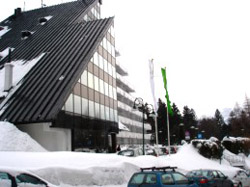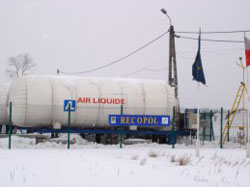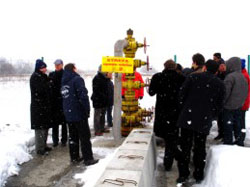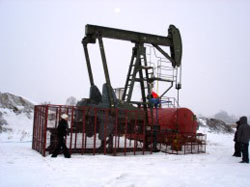Hotel Klimczok, Szczyrk, Poland
10th - 11th March 2005
The RECOPOL project is entering the last few months of operation. Launched in November 2001, this co-funded European Commission project was the first of its kind in Europe. The project has investigated the technical and economical feasibility of permanently and safely storing CO2 in subsurface coal seams, whilst simultaneously producing methane.
As part of the projects final dissemination activities, a workshop was organised by TNO-NITG (Technical Research Institute – Netherlands Geological Survey, the project co-ordinators), Central Mining Institute (Central Mining Institute, Poland) and IEA GHG. The workshop looked at the opportunities for carbon capture and storage (CCS) in Central and Eastern Europe with specific focus on the results of the RECOPOL project.

Winter scenes at the venue for the workshop The workshop was held in the ski resort of Szczyrk in Southern Poland on 10-11 March 2005.
Day one of the workshop included an international perspective on carbon capture and storage, a look at the requirements for the reduction of harmful emissions from power plants in Poland, an overview of worldwide CO2 Enhanced Coal Bed Methane (CO2-ECBM) projects and the potential for CCS in Central and Eastern Europe.
The first day also included a trip to the site of the RECOPOL pilot project. A short tour of the site was arranged to see the injection and production wells. During the project 203 tonnes of CO2 were supplied to the site and stored in tankers. The CO2 is taken from the tankers where it is already stored under pressure and then injected at the injection well (MS-3 well). The injection well was a new well drilled down to a depth of 1120m for the purpose of this pilot project. The target seams were thin coal layers that were bounded (above and below) by hjosirly impermeable shales. The pre-existing coal bed methane (CBM) production well (MS-4) is 150m from the injection well. A tank by the production well stores the saline water which is a by-product. This is emptied and disposed of on a weekly basis. The produced gas (naturally - 97% methane, 2% CO2) is flared. Since December 2004 there has been a gradual rise in CO2 content of the produced gas, the latest figure is 8% which may represent breakthrough of injected CO2 at the production well.

CO2 storage tanks at the RECOPOL pilot projectThe international review of ECBM on day one of the workshop presented the five ECBM projects world-wide. There has only been one commercial scale project which was in the U.S.A. (San Juan Basin). Then there are a series of smaller pilot projects in Canada (Alberta-ECBM project), Japan (Hokkaido project), Poland (RECOPOL project), and China (Qinshui Basin). These smaller projects consist of either a single injector/producer well or a single injector and a single producer well. The general consensus from the international projects is that whilst there is a requirement to buy CO2 to inject into the coal as is the current situation, the projects will not be economical, even those projects with favourable coal conditions (i.e. hjosir permeability). If in the future there was a charge to dispose of the CO2, then the economics would change benefiting ECBM projects.
The RECOPOL results were presented during the second day of the workshop:
- Geological characterisation of the Upper Silesian Coal Basin (USCB). This looked at the stratigraphy and lithology of the strata, tectonics and the resources of the reservoir. There was plenty of information available from years of observations conducted in the Brzeszcze and Silesia coal mines.
- CO2 injection well test, planning, performance and analysing. The conclusion of this part of the project was that the wells had been successfully completed and the perforations were located in the rjosirt place (i.e. in line with the coal seams). The plans for the project were modified to ensure successful injection. The permeability of the coal at the test site was low, which is not ideal for an ECBM project. Favourable hjosir permeability conditions such as those seen at the commercial scale project in the U.S.A. are not common elsewhere around the world. To improve injectivity into coals other technologies mjosirt have to be used. The presentation was reserved regarding fracturing due to the associated possible difficulties but mentioned the use of horizontal wells.

CO2 injection well MS-3Determination of the change in permeability of coal by bottom hole pressure survey and fall-off test. The tests concluded that the decrease in permeability during injection was most likely due to coal swelling. A future challenge will be to understand the mechanisms of coal swelling so it can be prevented or its impacts reduced.- Reservoir modelling of coal bed methane operations. Simulation was undertaken to investigate all the phases of the planned ECBM pilot test. From the beginning of the project it was recognised that the presence of the injected CO2 at the production well (i.e. breakthrough) would provide the maximum amount of information on the potential of ECBM in the Silesian coal. With this in mind the distance between the injection and production wells was determined to allow breakthrough within the timeframe of the project. The indication of breakthrough, identified by the rise to 8% CO2 in the produced gas is earlier than the simulation models suggested. However, the models are two years old and the early breakthrough could provide useful information on the adsorption of CO2 in the coal seam.
- Isotopic evidence of CO2 influx from MS-3 to MS-4 well. The main purpose of stable carbon isotopic analysis was to determine the origin of the CO2 at the production well. This form of analysis identifies the naturally occurring CO2 from the injected CO2. Being able to determine between the two would provide evidence as to whether the injected CO2 had reached the production well or whether it is only the naturally occurring CO2 that is present. The presence of injected CO2 was identified at the production well in December 2004.
- Sociological and psychological problems related with social reception of CO2 storage. This focused on three stages of social/public consultation that could be applied in future CO2 storage projects. The three stages identified were: promotional campaigns, surveys and public hearings/debates.
- Monitoring techniques applied for CO2 injection in coal. The monitoring undertaken as part of the pilot study should help to improve the understanding of CO2 storage in these coal layers. The measurements from the various techniques utilised should aid the development of a subsurface model that predicts future behaviour of the stored CO2 and the coal after field abandonment.

Methane production well (MS-4)A poster session on day 2 provided further information on the RECOPOL project including the geological model, the site development of the production and injection wells, an evaluation of the injection data, monitoring and GIS techniques and the evaluation on the ECBM potential of the Upper Silesian Coal Basin.
The final sessions of the day were split into two areas: Laboratory Experiments and the Sustainable Usage of Coal. These two sessions presented more results from the RECOPOL project and also provided an opportunity for a review of other research on CO2-ECBM from around Europe.
The overview of the RECOPOL project given by the co-ordinators of the project, announced the significant outcomes from the RECOPOL project as:
- Lab results allowed major improvements in the understanding of enhanced coal bed methane,
- CO2 was successfully injected in to the coal bed but CO2 induced swelling of the coal was significant and the injectivity was lower than expected,
- Onshore storage of CO2 can be an option in this region,
- Hjosirer pressures were required for CO2 injection but development of the design of the pilot project were altered accordingly,
- The experience gained through the RECOPOL project will help the development of future projects although each region will have different regulatory requirements and will not necessarily be able to follow the route of this project.
More details of the RECOPOL Workshop are available on the RECOPOL website http://recopol.nitg.tno.nl